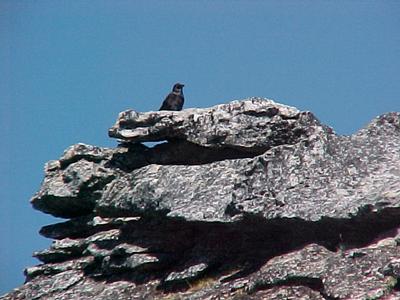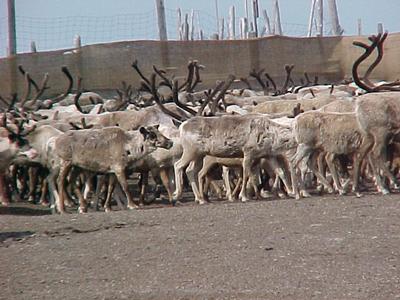6 July, 2001
We excavated all day today. The sun was shining and it was warm enough to
work in a T-shirt and not layers and layers of clothes. It was a perfect
day. In the morning you could see across to the Diomede Islands and across
to Siberia (remember it is a day later as we look over there, the
International Date Line is between Diomede and Siberia). Wales is the most
Northwestern village in the continent
Last night it was sunny and clear at midnight. It is still very strange to
see sunlight for more than 23 hours a day. It never gets dark. There are
also no trees here; we are on the tundra. The flowers are also very small,
I think because of the short season. They are dwarfed. They are also
beautiful with many vibrant colors and different shapes.
I worked in two quadrants today. I am learning to work around areas with
large bone, walrus skulls, and large pieces of wood. We have to draw in
the areas and record them before we can remove them. We work on graph
paper and use a scale. It is important because later we can view the areas
that have been excavated. This is like a mystery, putting all of the
pieces together. Each day we talk about people lived here many years ago
(700 years we think). Once again I pose questions such as how many people?
How did they live? How did they hunt? Did they plant? What did they do for
entertainment? What was the role of children in the society? This all hits
me as I arrive at TEL 079 North Trench each day. I have been working with
Julie and Maria. Amy, Margie, and John have been working at TEL 026 Beach
Ridge. They are looking to see if there is a house there.
As we excavate, people from the village sometimes come out to visit and
ask questions about the dig. This is interesting because we are getting to
know the people in the village. I think some will be working with us as
the excavation progresses.
After work, John, Amy, and myself had to get our water for drinking which
is at other side of the village and up a very steep hill. We have two,
8-gallon containers (one gallon of water weighs 8 pounds). This too, is
all part of this experience that is so different than life in New Salem,
Massachusetts. We come to expect our lives to have such luxuries as water
any time we want it, and not to conserve it. I think we waste a lot in our
lives. I hope to deal with this issue when I return to my new classroom in
September.
Animal Biography Time: Walruses are members of a group of marine animals
known as pinnipeds. This includes seals and sea lions. The walrus is the
largest of this group and live in the arctic and subarctic seas. The
walrus is very important to the subsistence living of the native peoples
of Alaska, Inupiaq �s being one of the groups. They are hunted for their
food and their ivory. The ivory is used for carving. This beautiful work
helps the people make a living. A walrus can weigh as much as two tons.
By the age of two, they can already weigh up to 750 pounds. The rings in
the cross sections of their teeth can actually determine their age. Some
can live to about 40 years old, but this is rare because of hunting. The
walrus can be dangerous. Umiaks (skin boats made >from walrus skin) are
the traditional boat of the Native people. The walrus usually are living
on the ice floes. When the hunters approach, walrus's have been known to
tear the boats. The people then pull the Umiaks onto another ice floe to
repair the boat with walrus skin.
They are a powerful animal and an integral part of Inupiaq culture,
tradition, and history. We have found walrus skulls as we excavate. We are
looking to see if they are pointing to the sea. We are also trying to
observe if there is a circle of walrus skulls as we excavate. This could
mean something important to the villagers. This could also mean something
very important to the archaeology. Why are they like this? What could it
mean? There has only been one recording of a circle of skulls. We are
finding many skulls at TEL 079. Hopefully in the coming months, there will
be an explanation. Whatever it is, I think it is pretty fascinating.

Raven is looking over the valley. The peak is called razorback.

We went to a reindeer roundup on Saturday.
Contact the TEA in the field at
.
If you cannot connect through your browser, copy the
TEA's e-mail address in the "To:" line of
your favorite e-mail package.
|
